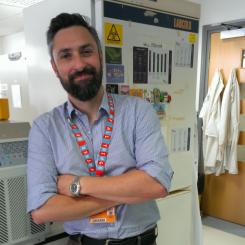 Dr William English
Dr William English
University of Sheffield
Awarded: £117,850
The challenge
When soft tissue sarcoma spreads to other parts of the body the lungs are the most common site. Sadly, fewer than 20% of these patients will survive beyond five years, meaning that new treatments are urgently needed.
In this project, based in the laboratory of Dr William English, a PhD student will use cutting edge laboratory methods to identify new treatments for soft tissue sarcoma that has spread to the lungs.
How will this project tackle this challenge?
Using cells isolated from patients with different types of soft tissue sarcoma, the student will test over 165 drugs to examine their effect. These drugs have been approved for clinical use in cancer already and so could be taken forward to testing in patients more quickly. The most promising drugs will then be tested in a laboratory model of soft tissue sarcoma after it has spread to the lungs.
The student will also look at differences in gene activity between the sarcoma cells from different types of soft tissue sarcoma and will combine this information with their response to the drugs to build a response profile, like a bar code. In the future, this bar code could be used to help match patients to the best drug for them.
What this means for people affected by sarcoma
Finding effective treatments for soft tissue sarcoma that has spread to the lungs would mean that more people survive the condition, and would provide a huge amount of hope for many people fearing the spread of their cancer.
When soft tissue sarcoma spreads to other parts of the body the lungs are the most common site. Sadly, fewer than 20% of these patients will survive beyond five years, meaning that new treatments are urgently needed.









